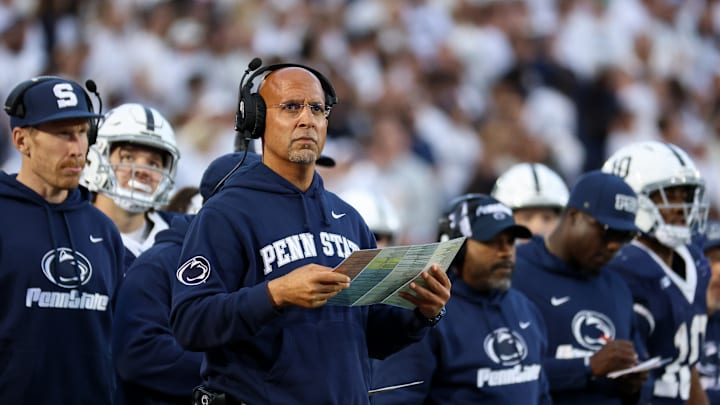The night Brent Pry was fired as the head coach of the Virginia Tech football team, in the wake of one of the most embarrassing losses in program history in Lane Stadium at the hands of Old Dominion, the Hokie faithful were hardly upset. After four seasons of dejection and disappointment under Pry, apathy had firmly taken root within the Virginia Tech fanbase, rotting away the deep wellspring of enthusiasm it was once so capable of tapping into in days gone by.
Now, that numb sensation felt by everyone who left the ODU game at halftime has been soundly beaten back, as optimism has returned to Blacksburg. After months of speculation, Virginia Tech announced the hire of its next head whistle: former Penn State head coach James Franklin.
Sources: Virginia Tech and James Franklin are finalizing an agreement for him to become the school’s next coach. Franklin has won 128 games over 15 seasons as the head coach at Vanderbilt and Penn State. He led Penn State to the CFP semi-finals last year. pic.twitter.com/Pr4TyLBB9N
— Pete Thamel (@PeteThamel) November 17, 2025
This hire is enormous. Virginia Tech landed one of the most sought after candidates in this season’s superbly chaotic coaching carousel. Franklin boasts a career .680 winning percentage during stints at Vanderbilt and Penn State; at the latter, he accumulated five top-10 finishes in the Associated Press Poll as well as winning the 2016 Big Ten Championship game and coached the Nittany Lions in last season’s College Football Playoff.
His pedigree speaks for itself. He is a proven recruiter who is familiar with the Mid-Atlantic and has routinely dominated the Virginia recruiting race. He’s coached numerous NFL stars, namely Micah Parsons and Saquon Barkley. Despite his on-and-off-field successes, his detractors point to his record against AP top-10 teams (4-21) that undid his tenure in Happy Valley as a sign that he doesn’t belong in Blacksburg. Franklin had a problem winning big games, sure. But he still regularly coached in big games, something the Hokies haven’t been very familiar with recently.
For a program that has called the cellar of the college football world home for almost all of the last decade, with this hire, Virginia Tech proved that it intends to be serious about football, again. No more mismanagement, no more excuses.
The Hokies have languished in crippling mediocrity for far too long, failing to adapt to the rapidly changing landscape of college football. Justin Fuente burned through the goodwill afforded to him in the wake of Frank Beamer’s retirement in 2015, as the former Memphis head coach couldn’t manage the necessary off-the-field nuances that come with being a power conference head whistle and his teams underwhelmed on the field. His replacement, Brent Pry, appeared out of his depth from day one. Nearly the inverse of Fuente, the first time head coach Pry won hearts and minds with his Lexington, Virginia drawl and enthusiastic embrace of tradition, but never could field competitive teams. Both men fell short of the lofty expectations laid upon them, and couldn’t fulfill their mandates.
Franklin comes to Blacksburg at an inflection point in the churning maelstrom that is the college football landscape, a reality that Virginia Tech appears to be bracing for. In response to ballooning financial demands–and to make up for years of underinvestment–the Virginia Tech Board of Visitors recently approved a $229 million investment in the athletics budget. Franklin will receive the lion’s share of this funding increase, and likely will be free to make whatever changes he deems necessary to ensure the Hokies succeed in the coming years that promise to bring even more tectonic changes to college sports.
Franklin's charge as Virgnia Tech’s head coach is not just to kickstart a floundering program and revive a starved fanbase, but it is also to deliver the Hokies from the unsettling reality they currently face in the near future. As further conference realignment looms large over the next decade, revenue sharing rolls out in earnest, and NIL persists at lightspeed, the alignment of who’s who in collegiate athletics hangs in the balance, and the programs that succeed will remain relevant. Unsuccessful programs, on the other hand, risk being relegated to the sidelines, indefinitely.
James Franklin must succeed in Blacksburg and must do so rapidly. Despite the recent historic investment in its athletics department, Virginia Tech does not enjoy the same financial windfalls as its SEC and Big 10 counterparts, and must forge its own path through the constantly shifting tides of college sports, namely by becoming overwhelmingly successful on the football field.
Franklin will have a wealth of newly-acquired resources at his disposal to shape the program how he sees fit. Critically, he almost certainly will have the full support of a rejuvenated fanbase that is desperate to return to its former glory. Now, unlike his two predecessors, he must fulfill the mandate given to him and at last deliver Virginia Tech to the heights it has desperately believed it could reach.
